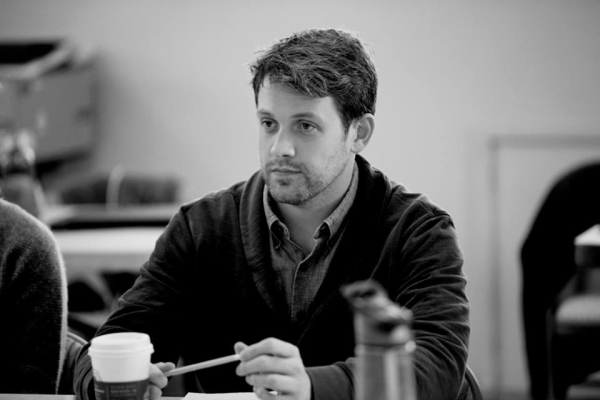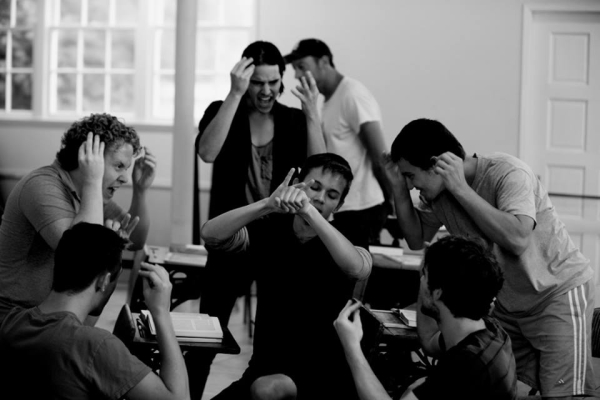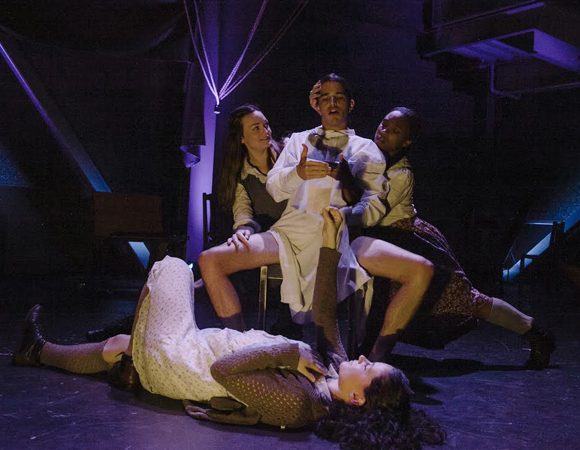Michael Arden Reinvents Spring Awakening With American Sign Language
The California-based Deaf West Theatre burst onto the Broadway scene in 2003 with its acclaimed revival of the musical Big River. Starring in that show was the young actor Michael Arden, who has since gone on to star onstage in Bare and the currently running FX television series Anger Management (among others). Arden never forgot about his experience in Big River; he returns to Deaf West frequently as an actor. Now, he's taking on a new challenge with the company: directing Duncan Sheik and Steven Sater's Tony-winning musical Spring Awakening. With a cast of 25 deaf, hard-of-hearing, and hearing actors and musicians, it's a take on the landmark musical unlike any other. In a recent conversation with TheaterMania, Arden talked about the unique skill set helming a production of this nature requires and the invigorating challenges it provides.

(photo courtesy of the production)
Tell me about the genesis of this production of Spring Awakening.
I've worked with Deaf West a few times; I got my start with them doing Big River, and I did Pippin with them out at the Taper. It's a company that's been near and dear to my heart for a long time. A year and a half ago, the artistic director asked me if I'd be interested in directing for them. I was talking to my partner, Andy Mientus, who had done the first national tour of Spring Awakening, [which is] a show we both knew and loved, and we thought that it would be a perfect fit for their treatment of the material. Ultimately, it's a story about people who are denied a voice.
How are you integrating deafness and sign language into your concept?
Our Moritz is deaf, and for the first time in Deaf West history of musicals, we're actually commenting on the fact that these characters are deaf, and these are hearing. We aren't living in a world in which everyone happens to know sign language. Our concept is that it's a small town in Germany where there was possibly an epidemic that left many members of the community without hearing, and the trickle-down effect of that. In Germany at that time, there was sterilization of deaf individuals, and it was forbidden for deaf and hearing couples to marry. It makes sense that when Moritz failed because he wasn't able to speak in class that he went on the road he goes on. It completely reinvented the material.
That's an incredibly fascinating take.
What's really interesting is that in 1880, there was a huge event that occurred in deaf culture, called the Milan Conference. I wasn't aware of that until I started working on this project. It was a worldwide symposium for deaf educators. They all traveled to Milan. They were mandated at this conference that the only way to truly absorb deaf kids into society was to forbid them from using sign language and to teach them oralism. Nine of the twelve speakers were proponents of oralism, and sign language was banned for many years after that…It's an incredible metaphor for the play and what all the characters are going through.

(photo courtesy of the production)
How many of your actors are deaf?
Half of our cast is deaf and half are hearing, and the band voices the deaf actors. Everyone is being asked to step outside of their comfort zone. The musicians are onstage as part of the company. Everyone is incredibly young and so talented. It's really exciting to work with a company that has to rise to the occasion. A lot of these young actors have never been in a play before.
If the production's Kickstarter is any indication, you've received a lot of support from the original Spring Awakening Broadway team.
I talked to Duncan Sheik a little bit and he's excited to see it. Steven Sater supported our Kickstarter. They've both been really wonderful throughout the process. [Original cast member] Skylar Astin has been a friend of mine in Los Angeles for a long time and I think he was more excited than anyone. When I told him we were going to do this he said, "Anything I can do to help." Jonathan Groff, as well.
Why is doing theater with Deaf West so important to you, as an artist?
When you're in it, you don't quite realize the impact it has. You're in the grid of Oh god, I have to learn a new language at the same time I'm speaking English…[but] it's thrilling work. I can't believe that I was lucky enough to randomly go to an audition for Big River, and here I am over a decade later spending every minute working with this company. It's exciting to share an art form that I would never have imagined sharing with the deaf community. Doing musicals, it's not like, oh, I'll do a musical with a deaf person. I didn't know a deaf person before I walked into that audition room. That's a testament to what theater can do: break down barriers.

(© Tate Tullier)











